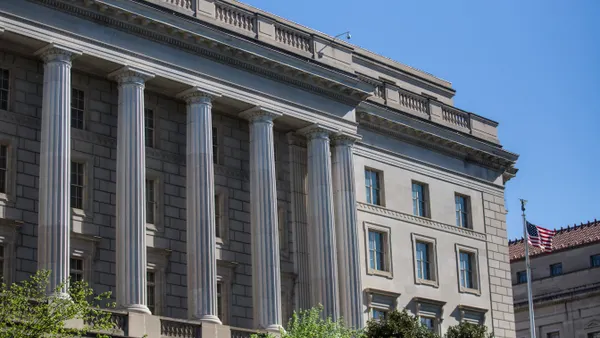Dive Brief:
- Regulatory scrutiny, compliance challenges, a downturn in the global economy and failure to obtain adequate valuation are most likely this year to discourage dealmakers from seeking funding through either a special purpose acquisition company (SPAC) or traditional initial public offering (IPO), Deloitte found in a survey.
- Half of private equity executives and 54% of corporate development professionals said they have no plans to pursue a SPAC or traditional IPO this year or in 2023, Deloitte said in a report on a survey of more than 940 executives.
- Many companies during the past several months took advantage of a robust deal market and quickly pushed through a SPAC or traditional IPO, according to Nicole Swenson, a risk and financial advisory managing director at Deloitte. “But a tougher test of mettle for public companies and their leaders might be in maintaining strong financial reporting and regulatory compliance after transaction close.”
Dive Insight:
The SPAC market this year is floundering after a record year in 2021.
Between Oct. 1 and Feb. 15, only one out of five closed deals traded above their $10-per-unit IPO price, according to SPAC Research. Also, only one of the nine SPAC deals announced last month was valued at more than $1 billion compared with nearly three quarters of the nearly 100 deals exceeding that amount announced during the first quarter of 2021.
The rate of SPAC IPO issuance has slowed, with just 51 transactions so far this year at an average size of $185 million compared with 613 transactions last year at an average size of $265 million, according to SPACInsider.
CFOs who want to take their companies public by merging with a SPAC have more choices than ever before. As of today, 614 SPACs are searching for companies to combine with in an initial public offering, according to SPACInsider.
The Deloitte survey indicates that sharper government oversight has triggered some of the decline in SPAC IPOs.
Regulatory scrutiny of transactional structures is most likely to discourage the pursuit of a SPAC or traditional IPO this year among 15.6% of private equity executives and 8.6% of corporate development executives, Deloitte found in its survey.
The challenge of compliance with regulations after a transaction is most likely to deter SPACs and traditional IPOS this year among 11.7% of private equity executives and 11% of corporate development executives, Deloitte said.
Securities and Exchange Commission Chair Gary Gensler has repeatedly warned that SPACs pose risks to investors. He has said the agency will investigate how the shell companies raise cash from the public and merge with target companies, and has asked agency staff to recommend robust disclosure rules for SPACs.
“SPAC sponsors generate significant dilution and costs for investors,” Gensler warned during a meeting of the agency’s Investor Advisory Committee in September.
In a Dec. 9 speech Gensler noted the need for safeguards against fraud and conflicts of interest, saying “I believe the investing public may not be getting like protections between traditional IPOs and SPACs.”
The CFA institute has voiced similar concerns, saying the SPAC market poses risks to investors from celebrity hype, conflicts of interest, a scarcity of basic information and an abundance of the so-called blank check companies chasing a limited number of opportunities, according to the CFA Institute.
“The mounting numbers of SPACs already in the public market pose growing investor protection concerns,” the CFA Institute said in a “SPAC Crib Sheet” highlighting “key structural, risk and conflict issues that investors should understand.”
A SPAC has been perceived to be a faster, cheaper way to raise money than through a conventional IPO. It sells shares listed on a stock exchange and then merges with a private company, usually within two years, in a so-called de-SPAC transaction.















